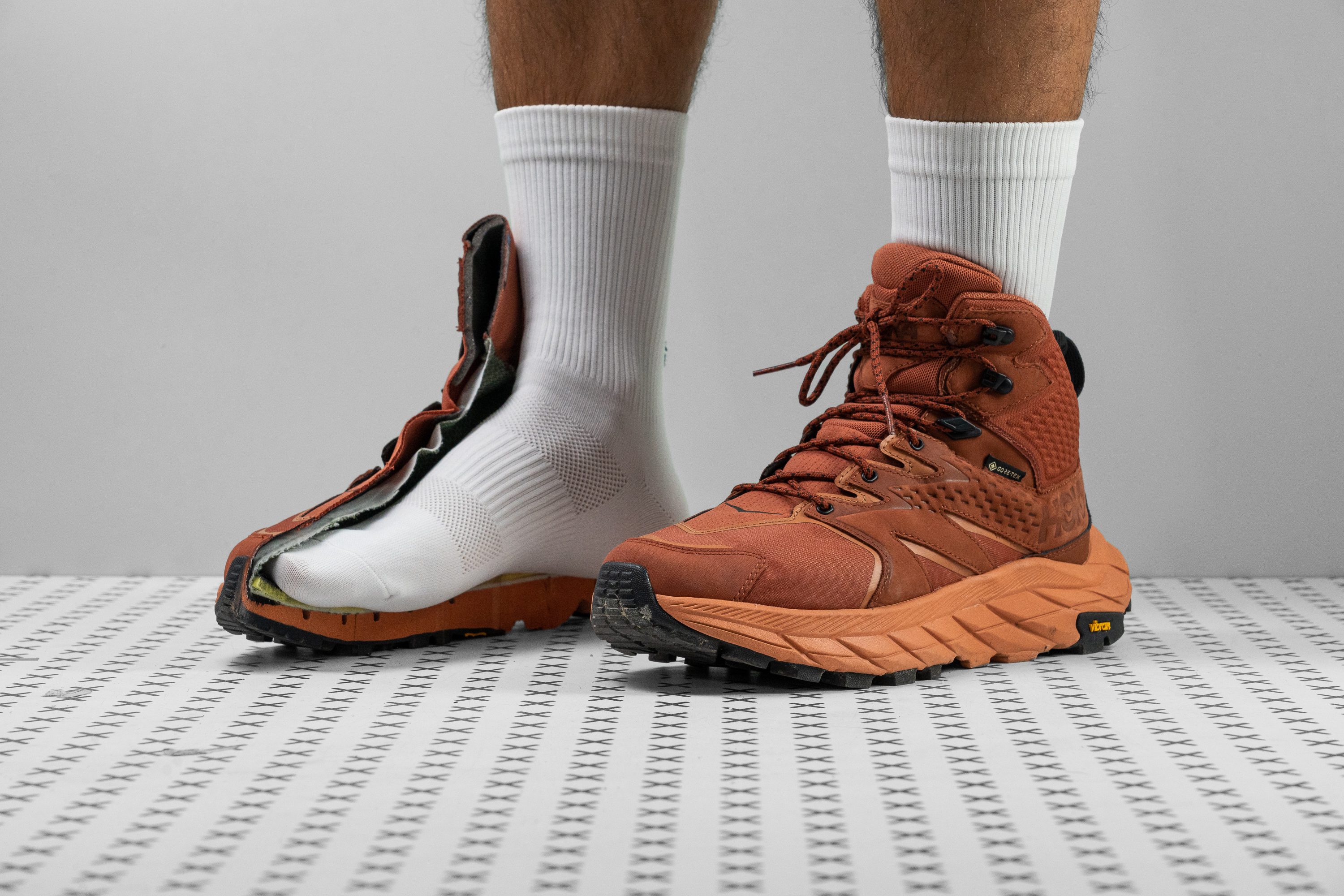Our verdict
- Our top pick in best hiking boots
- Our top pick in Hoka Hoka Challenger ATR
Pros
- Top-notch waterproofing
- Very lightweight
- Generous and soft cushioning
- Reliable stability (with a light backpack)
- Wide platform
- Flexible forefoot
- Excellent grip
- Doesn't get too firm or stiff in cold
- Comfortable in-shoe feel
- Effective lacing system
- Sustainable materials
Cons
- Not supportive with heavy backpacks
- hoka one one x opening ceremony clifton 1111595 wtrb
- Extended heel catches rocks and roots
- Not for wide feet
- Tricky to put on
Audience verdict
- Top 23% most popular hiking boots
Comparison
The most similar hiking boots compared
+ + Add a shoe | |||||
|---|---|---|---|---|---|
| Audience score | 84 Good! | 79 Good! | 81 Good! | 76 Decent! | |
| Price | $185 | $240 | $185 | $170 | |
| Trail terrain | Technical terrain | Technical terrain | Technical terrain | Moderate terrain | |
| Weight lab Weight brand | 15.4 oz / 436g 16 oz / 454g | 18.5 Sandalen HOKA ONE ONE W Hopara 1106535 Csbcr 16.8 oz / 476g | 15.5 zapatillas de running HOKA ONE ONE media maratón veganas 15.3 oz / 434g | 11.7 oz / 332g 10.6 zapatillas de running HOKA ONE ONE hombre entrenamiento pie normal talla 44 rojas | |
| Lightweight | ✓ | ✓ | ✓ | ✓ | |
| Breathability | Warm | Warm | Warm | Moderate | |
| Use | Day HikingSpeed HikingLight HikingSnow | BackpackingDay HikingSnow | Day HikingLight HikingSnow | Day HikingSpeed HikingLight HikingSnow | |
| Foot condition | Flat feetPlantar fasciitisOverpronation | Flat feet | Flat feetPlantar fasciitisOverpronation | - | |
| Orthotic friendly | ✓ | ✓ | ✓ | ✓ | |
| Drop lab | 10.6 mm | 11.2 mm | 11.2 mm | 14.7 mm | |
| Midsole softness | Soft | Soft | Soft | Soft | |
| Difference in midsole softness in cold | Big | Normal | Normal | Small | |
| Heel counter stiffness | Moderate | Flexible | Stiff | Moderate | |
| Stiffness | Moderate | Moderate | Flexible | Moderate | |
| Difference in stiffness in cold | Big | Big | Big | Big | |
| Outsole hardness | Average | Average | Average | Very soft | |
| Waterproofing | Waterproof | Waterproof | Waterproof | Waterproof | |
| Material | Leather | Leather | - | Mesh | |
| Season | Winter | Winter | Winter | Summer | |
| Toebox durability | Bad | Good | - | Decent | |
| zapatillas de running HOKA ONE ONE competición asfalto maratón talla 47.5 más de 100 | Bad | Good | - | Decent | |
| Outsole durability | - | - | - | Good | |
| Toebox width at the widest part | Narrow | Narrow | Narrow | Medium | |
| HOKA Kawana Schuhe für Herren in Scuba Blue Bellwether Blue Größe 46 | Narrow | Medium | Narrow | Medium | |
| Lug depth | 4.7 mm | 4.9 mm | 4.7 mm | 3.5 mm | |
| Heel stack lab | 36.7 mm | 39.3 mm | 36.9 mm | 38.1 mm | |
| Forefoot | 26.1 mm | 28.1 mm | 25.7 mm | 23.4 mm | |
| Widths available | Normal | Normal | Normal | NormalWide | |
| Technology | Gore-TexVibram | Gore-TexVibram | Gore-TexVibram | Gore-TexVibram | |
| Cut | Mid cut | High cut | Mid cut | Mid cut | |
| Removable insole | ✓ | ✓ | ✓ | ✓ | |
| Ranking | #18 Bottom 33% | #25 Bottom 7% | #23 Bottom 14% | #26 Bottom 3% | |
| Popularity | #6 Top 23% | #1 Top 4% | #7 Top 26% | #25 Bottom 7% |
Who should buy
Having put the Hoka Hoka One One Evo Rehi through a series of trail challenges and lab tests, we believe that it is a solid option for the following:
- hikers who often pick up the pace (the boot is really light and generously cushioned)
- people who enjoy extra in-shoe comfort and padding
- an excellent value for money (the Anacapa is £20 cheaper than hiking boots on average)
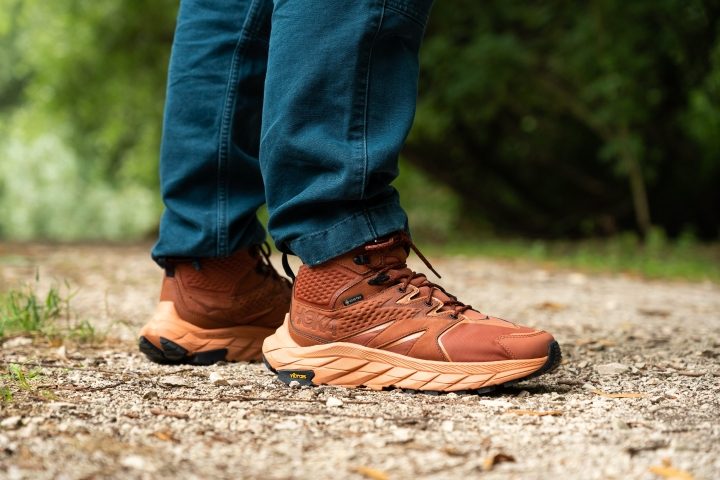
Who should NOT buy
With its lightweight setup and soft ankle collar, the Hoka One One Evo Rehi falls short of the stability and ankle support provided by the proper backpacking boots. If you intend to haul over 30 pounds on your hikes, we recommend the Con estas Hoka Mach 5 or the Salomon Quest 4 GTX instead.
With burlier toe bumpers, these boots also provide next-level protection from bumping into rocks and roots.
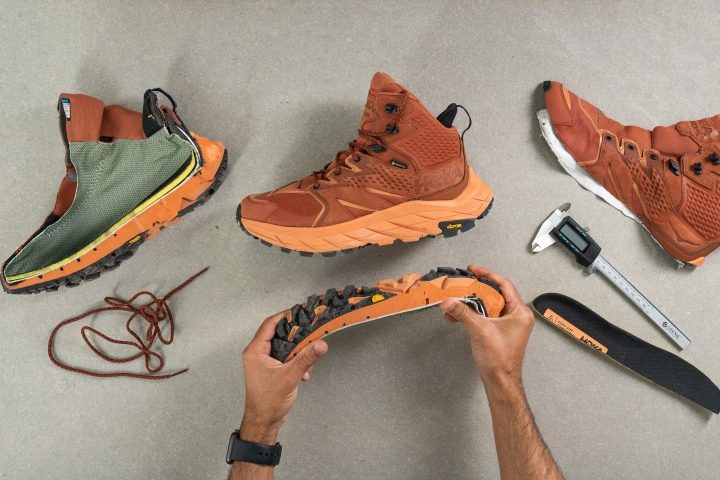
Breathability
As a waterproof boot that's lined with a GORE-TEX membrane, breathability is the last thing you can expect from the Hoka One One Evo Rehi.
Pumping smoke through the boot's upper, we never saw it come out on the other side. Ventilation is non-existent here. Thus, the boot only gets 1 out of 5 for breathability.
Hoka Hoka One One Evo Rehi vs. Merrell Moab 3
But if you are here for that watertight experience, the Hoka One One Evo Rehi won't let you down. Be it wet grass, creek crossings, or pouring rain, the boot tackles them all with flying colours.
Looking at the Anacapa Mid's upper through a microscope, there is just no way for the water to get in given its extra tightly woven mesh.
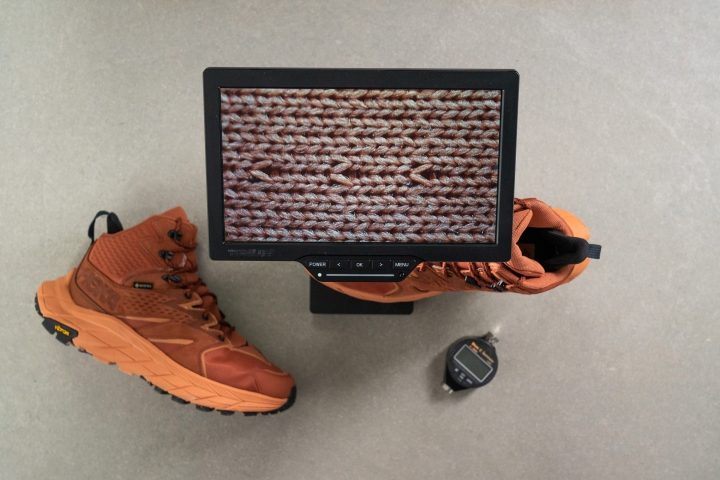
Under Armour amortiguación media talla 36.5 marrones!
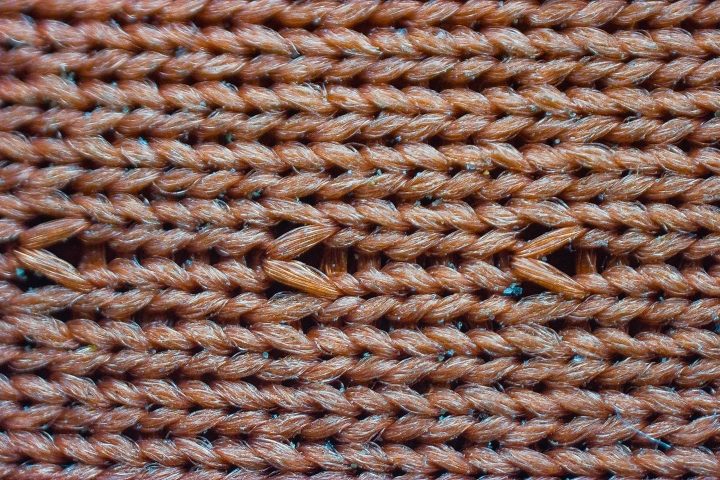
Putting the boot's upper against a source of bright light shows us that there are no sneaky apertures either.
Just be aware of the depth of rivers and puddles on your way. As you can see, the heel portion of the boot doesn't extend all the way up, which increases the risk of water getting inside.
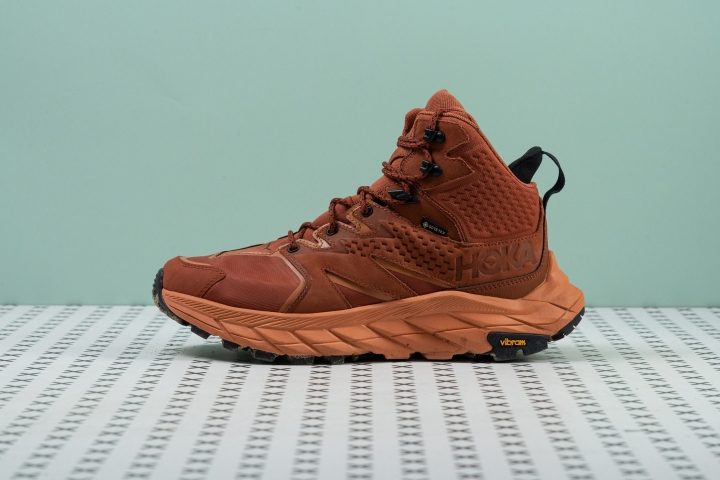
If that's a major concern for you, we recommend the HOKA Clifton L Suede Schuhe Größe 45 1 3 instead. It comes with a regular tall collar and the Gore-Tex lining comes up higher in it. It is a better option for deep puddles and river crossings.
| Hoka One One Evo Rehi | 1 |
| Average | 1.6 |
Durability
Toebox durability
Considering the Anacapa's price, the durability of its upper materials was a HUGE disappointment to us. Especially in such a sensitive area as the toebox.
Applying our Dremel to its mesh material for 12 seconds resulted in a large see-through hole. This is not very common for hiking boots of this calibre.
For comparison, the Hoka Kaha 2 GTX got away with just a scratch after the same Dremel test. No wonder it comes with a higher price tag of £240.
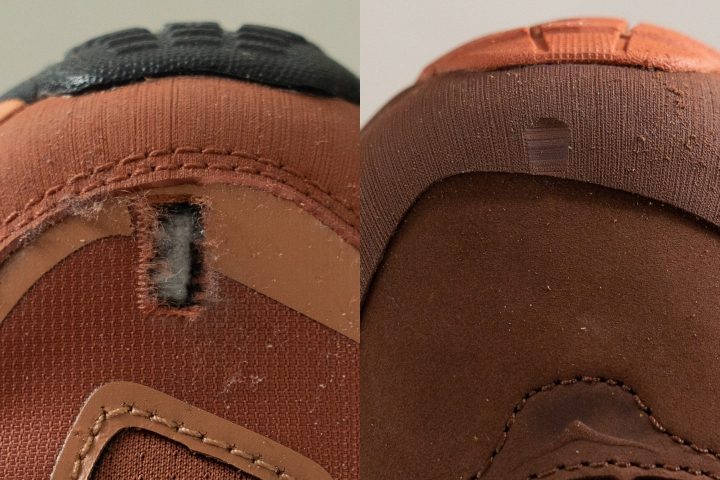
We applied the Dremel with the same force (3.2N) and speed (10K RPM) to both shoes.
| Hoka One One Evo Rehi | 1 |
| Average | 4.4 |
Saucony amortiguación media constitución fuerte talla 38.5 | zapatillas de running HOKA ONE ONE competición asfalto maratón talla 47.5 más de 100
We observed the same issue with the heel padding.
Holding a Dremel against the collar for only 4 seconds left significant wear on the lining. We rated the durability of this section as 2 out of 5, where 1 is the least durable.
Given how much rubbing this part of the boot endures on long hikes, we don't think it will last long on the Hoka One One Evo Rehi.
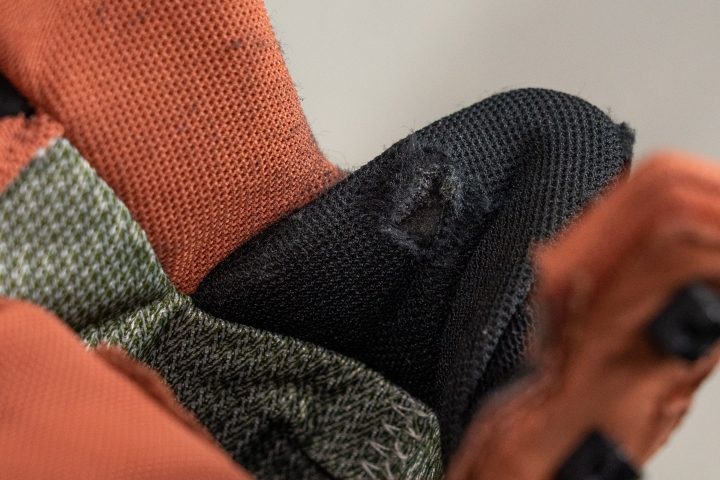
| Hoka One One Evo Rehi | 2 |
| Average | 4 |
Outsole hardness
The Anacapa's Vibram outsole looks a little more promising.
In our experience, harder rubbers tend to last longer. And so we tested its hardness by pressing a durometer against the outsole.
The reading shows 86 HC which is a solid average for hiking boots.
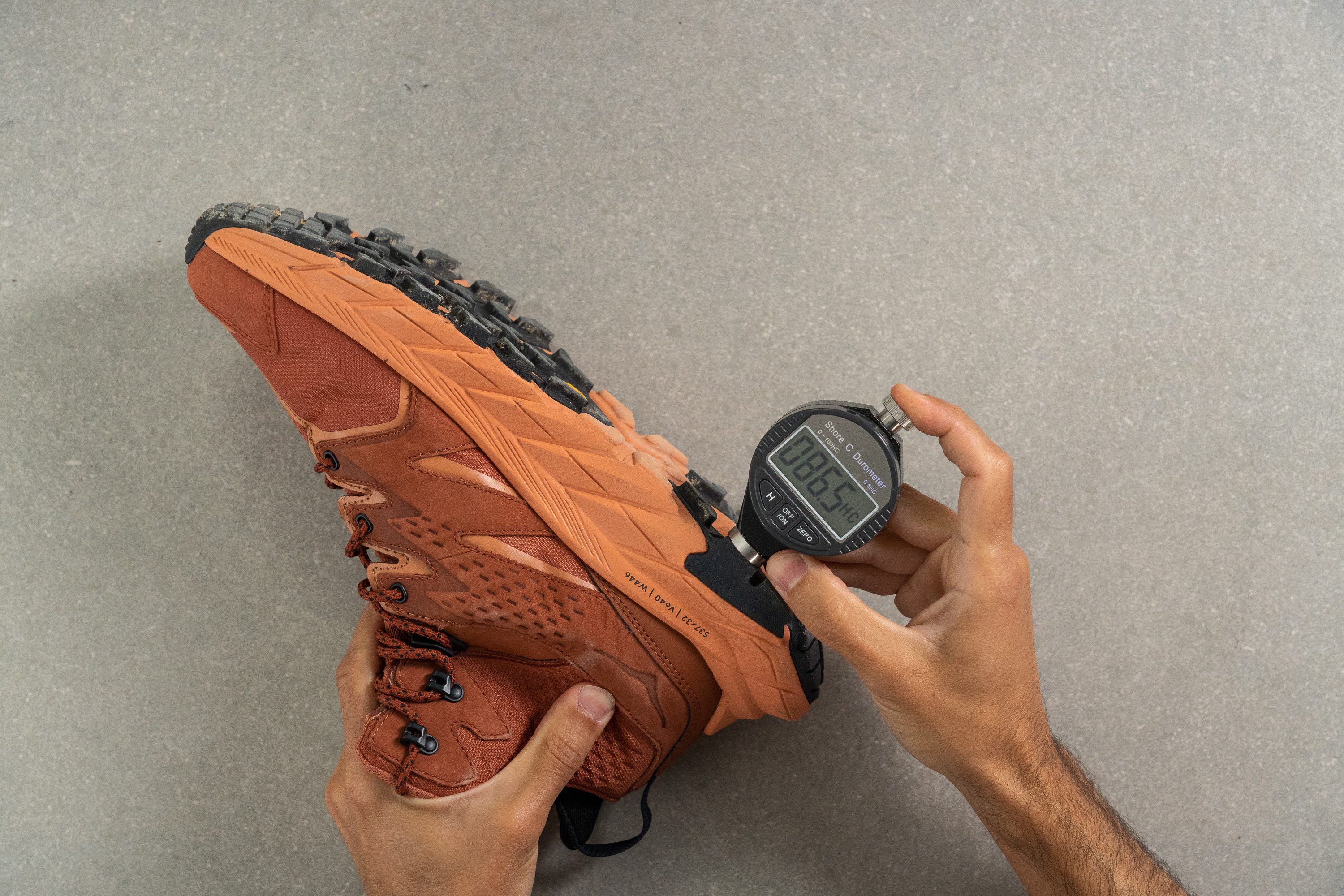
| Hoka One One Evo Rehi | 86.0 HC |
| Average | 87.6 HC |
Outsole durability
To further explore the boot's wear resistance, we applied a Dremel to its rubber for 12 seconds.
Assessing the level of damage caused to the outsole, we rated its durability as 4 out of 5. It is among the more durable compounds we've seen in hiking footwear.
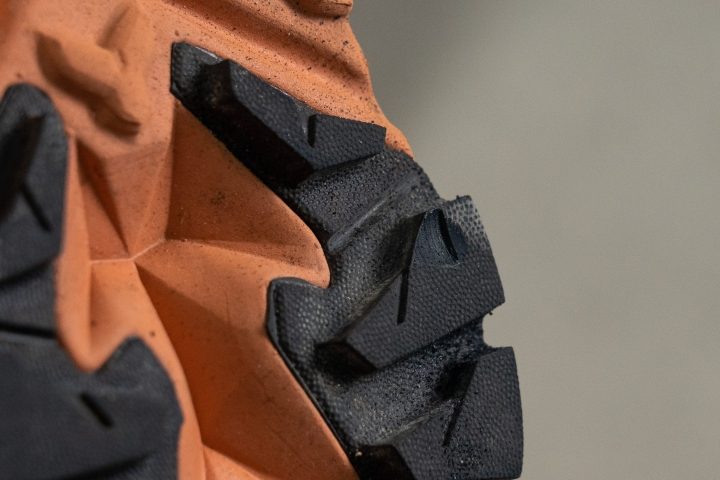
The only caveat is that the rubber doesn't cover the entire base of the boot. We are worried that the exposed (orange) areas will wear down much quicker than the rubberized areas.
Outsole thickness
The thickness of the base rubber (without the lugs) turns out to be thinner than average.
Based on our calliper measurement, this layer is only 2 mm thick. This doesn't mean that you will lose the outsole after the first hike but we do anticipate that the Hoka One One Evo Rehi will wear out faster than most hiking boots.
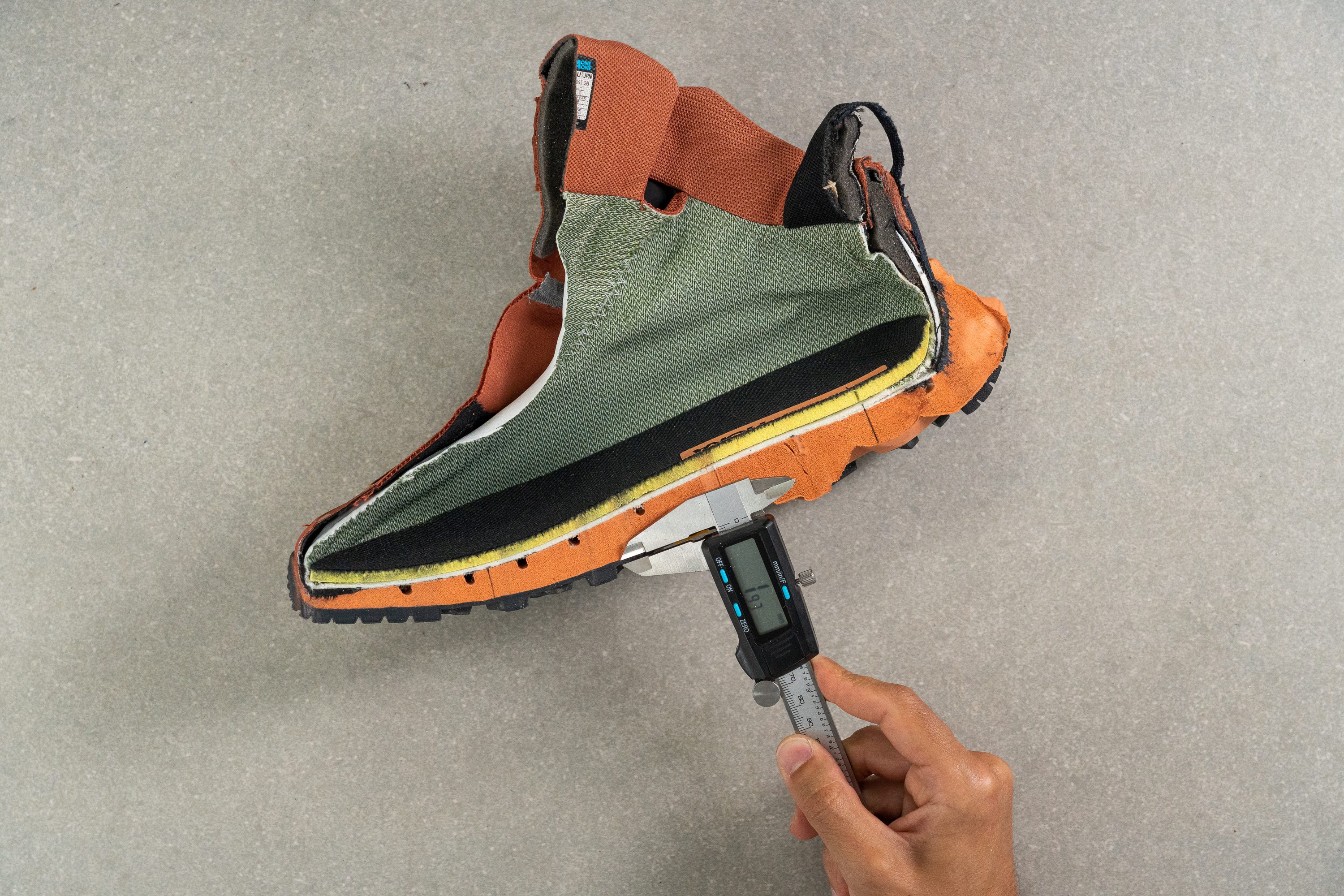
| Hoka One One Evo Rehi | 2.0 mm |
| Average | 3.1 mm |
Weight
Now we finally get to the point where the Hoka Hoka One One Evo Rehi begins to receive praises!
This boot feels really light on the foot and our measurement confirms it. We weighed it at 15.4 oz (436g) in a men's US size 9. This is even lighter than stated by the brand - 16 oz (454g)!
And it's certainly lighter than hiking boots on average - 19.5 oz (553g).
What's the benefit? You feel more agile and manoeuvrable on the trail and you can even speed up the pace to light running. Less weight in a hiking boot always means less fatigue too.
| Hoka One One Evo Rehi | 15.38 oz (436g) |
| Average | 18.45 oz (523g) |
Cushioning
Heel stack
It wouldn't be a Hoka without a tall stack height.
Measuring the boot's heel stack with a calliper, we found it to be 36.7 mm. It is a little thicker than average but nothing crazy. To be honest, we expected it to be taller given how massive the Anacapa looks at first sight.
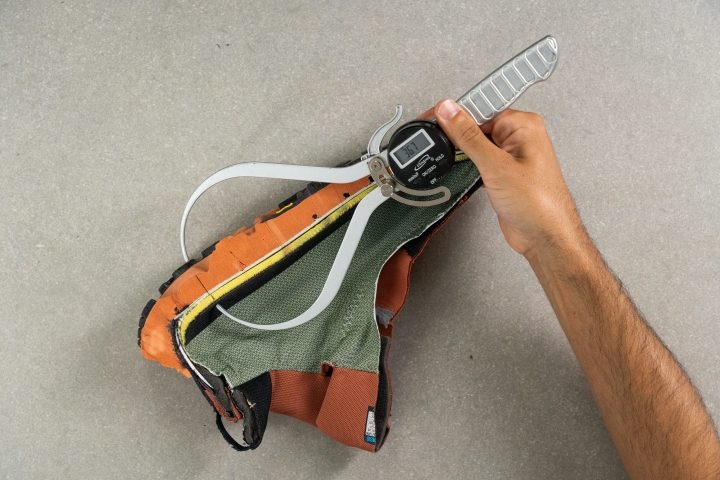
We found this amount of cushioning to be just perfect for day hikes of any distance. Our feet felt pampered all throughout the outdoor test.
One feature that really enhances the heel cushioning of the Hoka Anacapa is its extended heel geometry, or the Hubble heel, as the brand calls it. Being familiar with this design from Hoka's running shoes, it felt right at home, making the landings extra cushy and smooth.
The downside of this heel is that it did get caught in between rocks and roots when we traversed the more technical parts of the route. But given that this boot is not intended for advanced trails in the first place, this can be forgiven.
| Hoka One One Evo Rehi | 36.7 mm |
| Average | 36.3 mm |
Forefoot stack
Under the toes, the Hoka Hoka One One Evo Rehi is just as well-cushioned. We measured its forefoot stack at 26.1 mm, which is also a little over the average.
We appreciated the added forefoot cush when going down the hills as well as tiptoeing our way through sharp rocks.
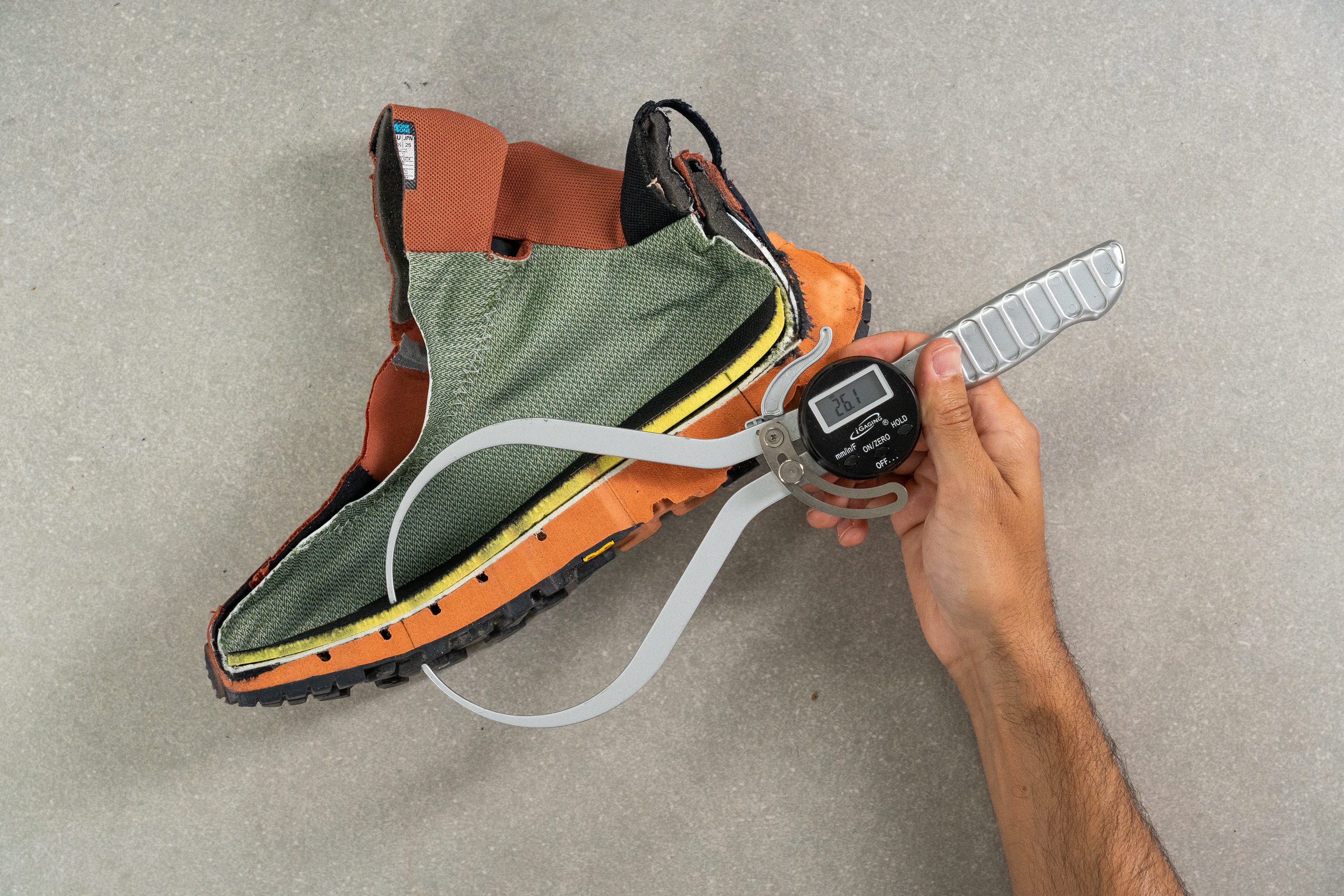
| Hoka One One Evo Rehi | 26.1 mm |
| Average | 22.5 mm |
Drop
Doing a simple subtraction, we found that the heel-to-toe drop in the Anacapa is 10.6 mm. This is notably higher than the officially stated 6 mm.
This is not necessarily a bad thing because hiking boots on average have a drop of 10-12 mm, offering more cushioning in the heel.
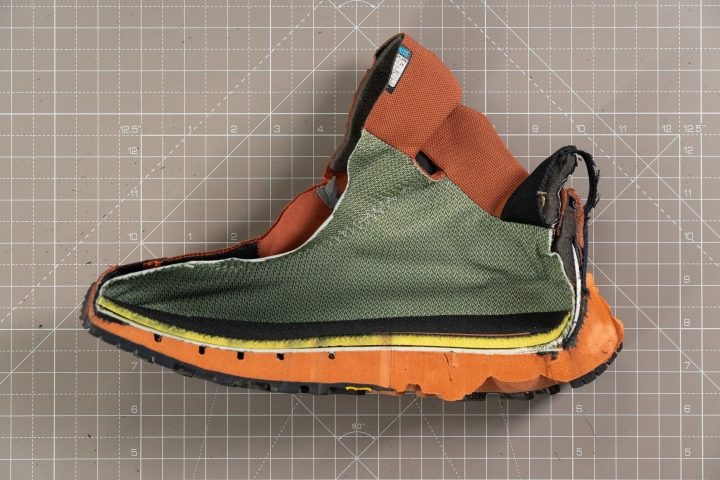
But if you are a diehard fan of low drops, we think the HOKA Mach Supersonic Chaussures pour Homme en Radiant Yellow Taille 45 1 3 is a better option. This boot places your feet parallel to the ground, with no heel elevation, similar to what you would feel like barefoot. In our experience, it gives you more stability and control over the tricky terrain but you do need stronger feet and ankles to reap the benefits of it.
We recommend that beginner hikers stick to hiking boots with a higher drop, like that in the Anacapa Mid.
| Hoka One One Evo Rehi | 10.6 mm |
| Average | 13.8 mm |
Midsole softness
If it wasn't for the high collar, we wouldn't be able to tell the Hoka One One Evo Rehi apart from a Hoka running shoe.
The boot uses a compression-moulded EVA for cushioning which feels rather plush underfoot. Pressing a durometer against the foam, we found that at 22.5 HA, it is indeed softer than average.
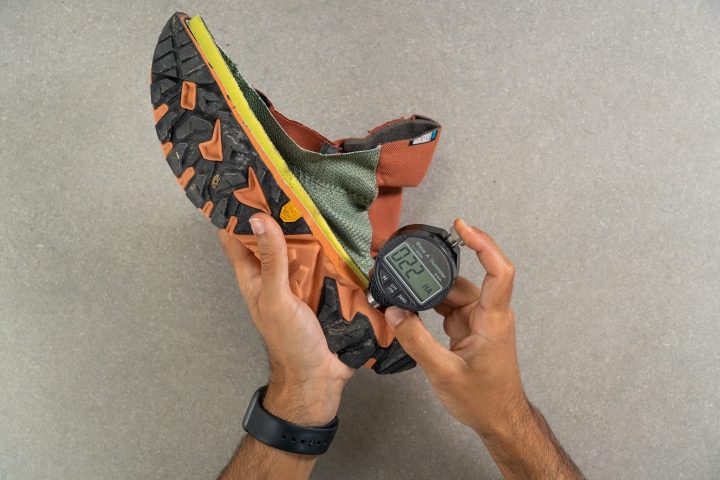
Even though the brand tags the boot's cushioning as "balanced," we could argue that it is among the plushest we've seen in our lab.
| Hoka One One Evo Rehi | 22.5 HA |
| Average | 27.3 HA |
Difference in midsole softness in cold
Planning to rock the Hoka One One Evo Rehi in cold months? We've got great news for you!
Having exposed the boot to winter-like conditions (*ahem* put it in the freezer for 20 minutes), we found that the foam remained relatively soft! Our durometer shows that the midsole only froze up to 29.5 HA. This is the typical "softness" of hiking boots at room temperature.
So, instead of turning into a brick of ice in low temperatures, this Hoka boot turns into a... regular hiking boot.
"The cold never bothered me anyway" is the perfect motto for the Hoka One One Evo Rehi.
Despite getting 31.1% firmer after the freezer test, this Hoka boot didn't lose much softness compared to hiking boots on average.
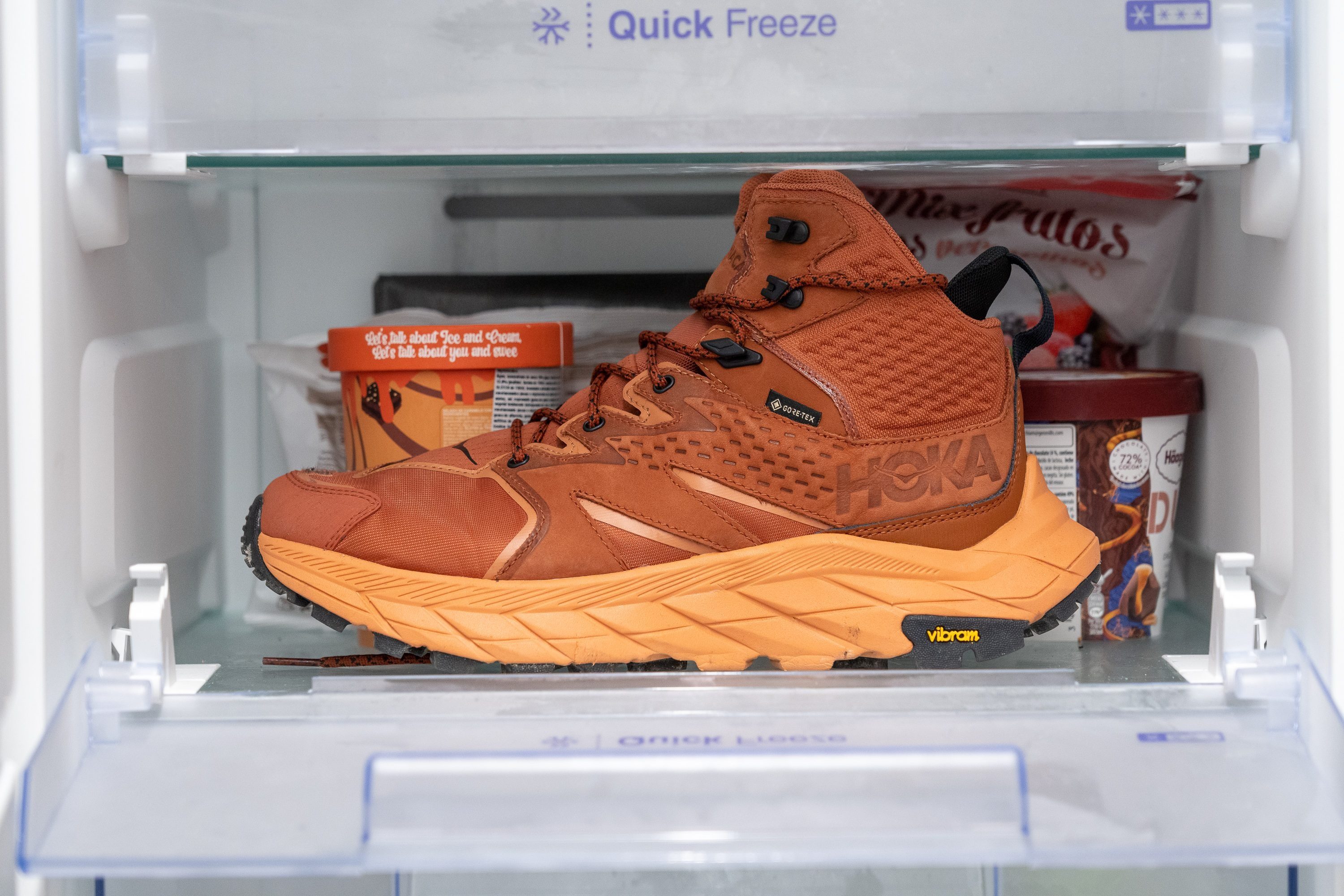
| Hoka One One Evo Rehi | 31.1% |
| Average | 19.1% |
Saucony amortiguación media constitución fuerte talla 38.5 | Insole thickness
Measuring the widest part of the heel at 93.1 mm, we also found it to be sufficiently wide for a hiking boot.
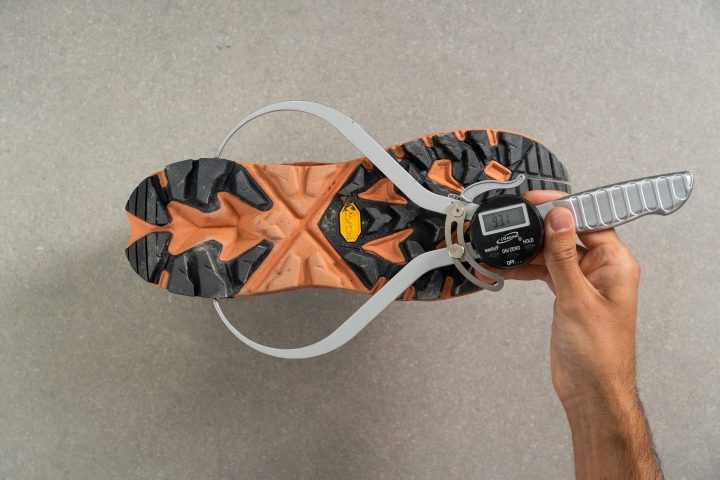
The peculiar sole design at the heel also contributed to stable landings. However, its visual aspect can be polarising. For some of us, it is reminiscent of goat hooves.
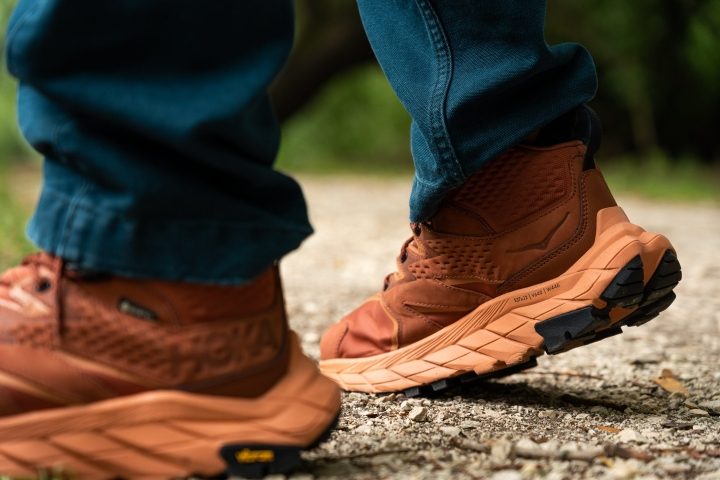
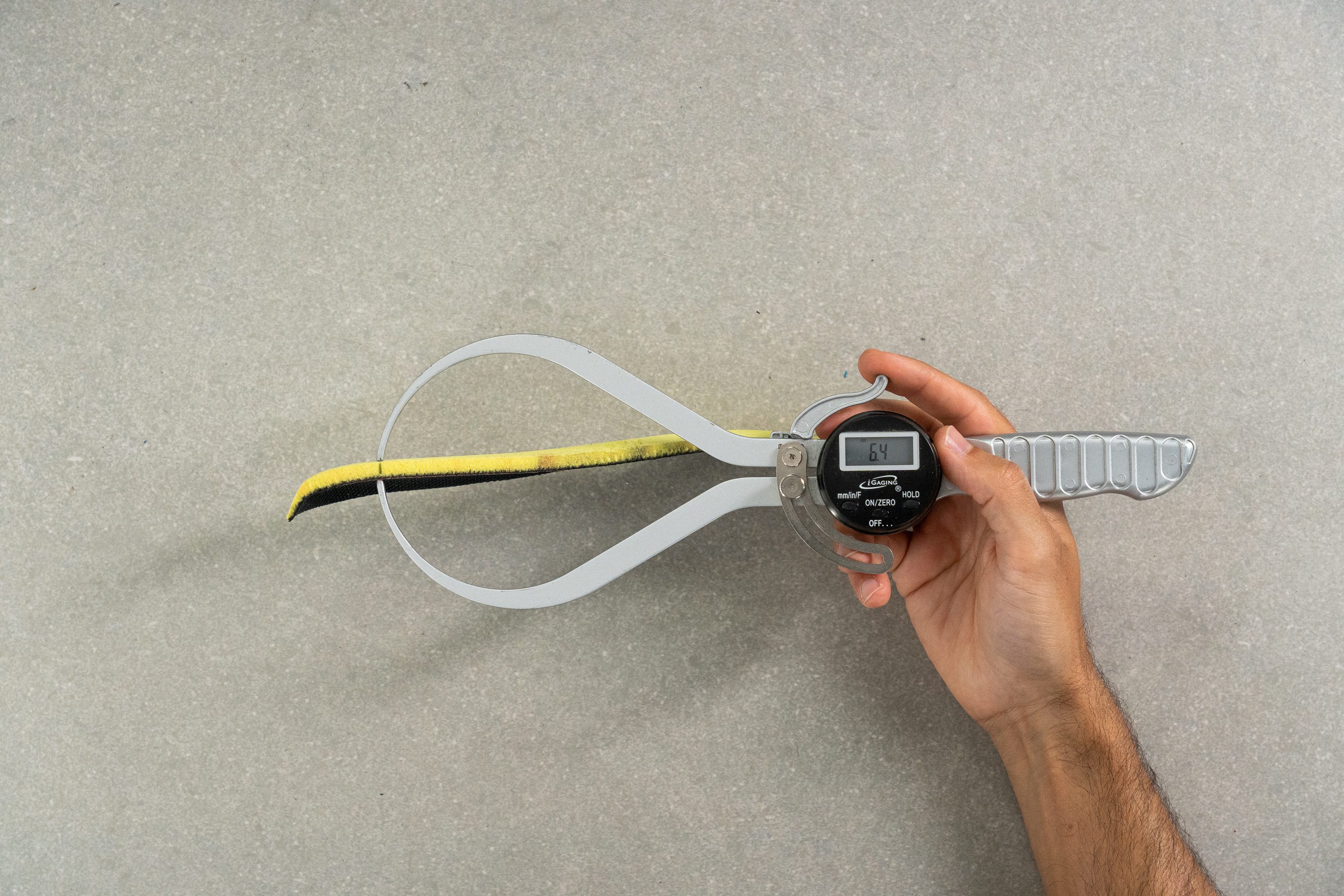
| Hoka One One Evo Rehi | 6.4 mm |
| Average | 6.1 mm |
Stability
HOKA Womens Kawana Shoes in Peach Parfait Shell Coral
To make things clear, we performed the stability test below without carrying a backpack. Unweighted, the Hoka One One Evo Rehi feels amazingly supportive around the ankle.
We believe that this boot performs best when hiking light, with a load below 35 pounds (16 kg). We don't recommend picking up a heavier backpack with it because the upper part of the boot's collar is not as structured as in backpacking boots. It is going to result in a lot of shifting and sliding as the collar starts to feel flimsy under a heavy load.
Torsional rigidity
Heel collar aside, the platform of the Hoka One One Evo Rehi proved to be mighty stable.
Trying to twist the boot, we were pleasantly surprised with its stiffness. For that reason, we rated its torsional rigidity as 5 out of 5.
It's going to take a lot of effort to twist the ankle in this Hoka boot (as long as you keep the weight down of course).
| Hoka One One Evo Rehi | 5 |
| Average | 4.3 |
Heel counter stiffness
We experienced a very secure heel hold inside the Hoka One One Evo Rehi. Assessing the stiffness of its heel counter, we gave it a rating of 4 out of 5. Nearly perfect!
This is another major contributing factor to the boot's ankle support.
| Hoka One One Evo Rehi | 4 |
| Average | 3.5 |
Midsole width in the forefoot
Completing the ensemble is a wide and steady landing area.
We measured the widest point of the forefoot at 112.5 mm, which is a solid average across hiking boots.
Having a wide surface to rely on made us feel very surefooted on uneven terrain. It also gives plenty of space for even distribution of weight across the foot, which is an essential stability component.
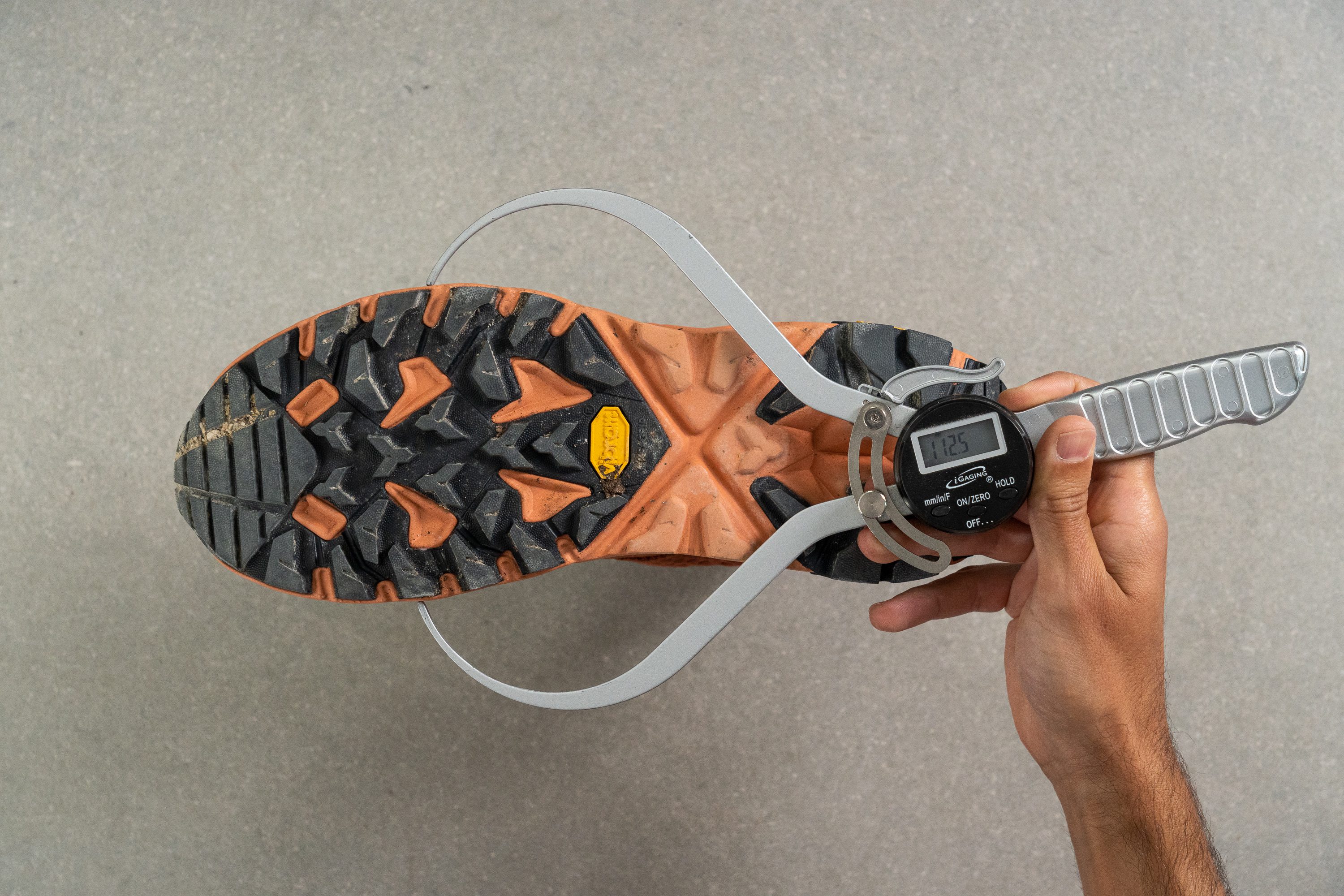
| Hoka One One Evo Rehi | 112.5 mm |
| Average | 111.6 mm |
HOKA hombre amortiguación media talla 27
Measuring the widest part of the heel at 93.1 mm, we also found it to be sufficiently wide for a hiking boot.

The peculiar sole design at the heel also contributed to stable landings. However, its visual aspect can be polarising. For some of us, it is reminiscent of goat hooves.

| Hoka One One Evo Rehi | 93.1 mm |
| Average | 87.9 mm |
Flexibility
Stiffness
We were surprised to find out that the Hoka One One Evo Rehi is actually more flexible than hiking boots on average. Despite its tall stack height and torsional rigidity, it took less force to bend it to a 90-degree angle than many other boots.
It only required 31.5N of force, which is 30% less than average!
With this flexible setup, we definitely felt more freedom of movement when navigating the more challenging parts of the trail.
| Hoka One One Evo Rehi | 31.5N |
| Average | 44.3N |
Difference in stiffness in cold
Similar to the boot's cushioning softness, its flexibility is not affected by low temperatures as much.
After keeping the Hoka One One Evo Rehi in the freezer for 20 minutes, it took 45.2N to bend it to a 90-degree angle. This is still 30% more flexible than the average of hiking boots after the same test.
What's more, the Anacapa didn't even stiffen up as much as most hiking boots did. Based on our measurements, it got 43.2% stiffer whereas the average of hiking boots lost their flexibility by around 50%.
| Hoka One One Evo Rehi | 43.2% |
| Average | 25.4% |
Grip / Traction
Lug depth
According to the brand, the lug depth on the Hoka Hoka One One Evo Rehi is 5mm. This was confirmed in our own calliper measurement as we got a 4.7 mm depth.
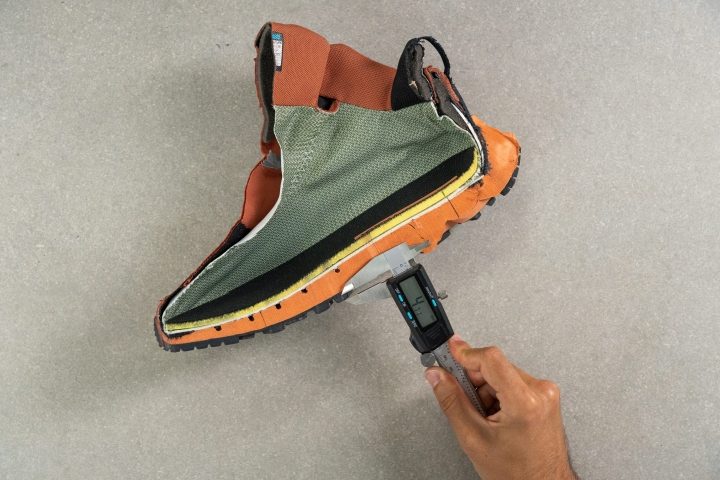
From our hiking experience in the boot, we had absolutely no issues stepping on rocks and roots, going into dirt and river crossings, or passing through wet grass.
On the downside, the rubber itself lacked tackiness when it got to more technical terrain. We felt a bit slippery on wet granite.
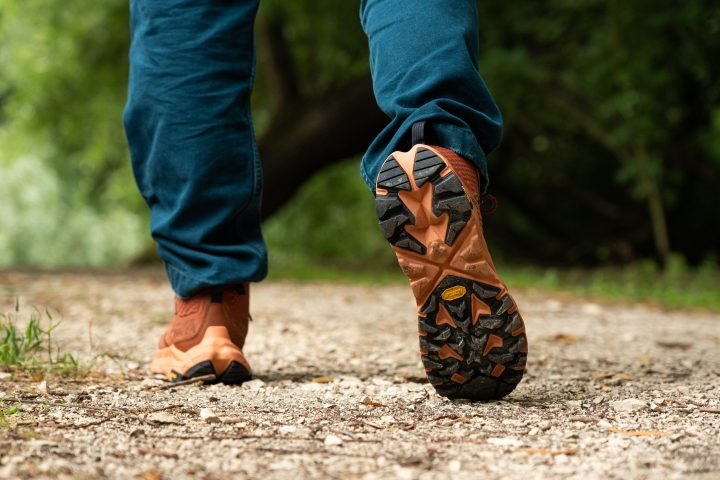
| Hoka One One Evo Rehi | 4.7 mm |
| Average | 4.2 mm |
Size and fit
Toebox width at the widest part
Checking the toebox width with a calliper, we found that it is 95.5 mm at its widest part. This is narrower than the average but not enough to tag it as narrow per se.
hoka gaviota 2 chaussures de route pour hommes en blackdark shadow taille 43 13 1099629 bdsd HOKA Mach Supersonic Chaussures pour Homme en Radiant Yellow Taille 45 1 3.
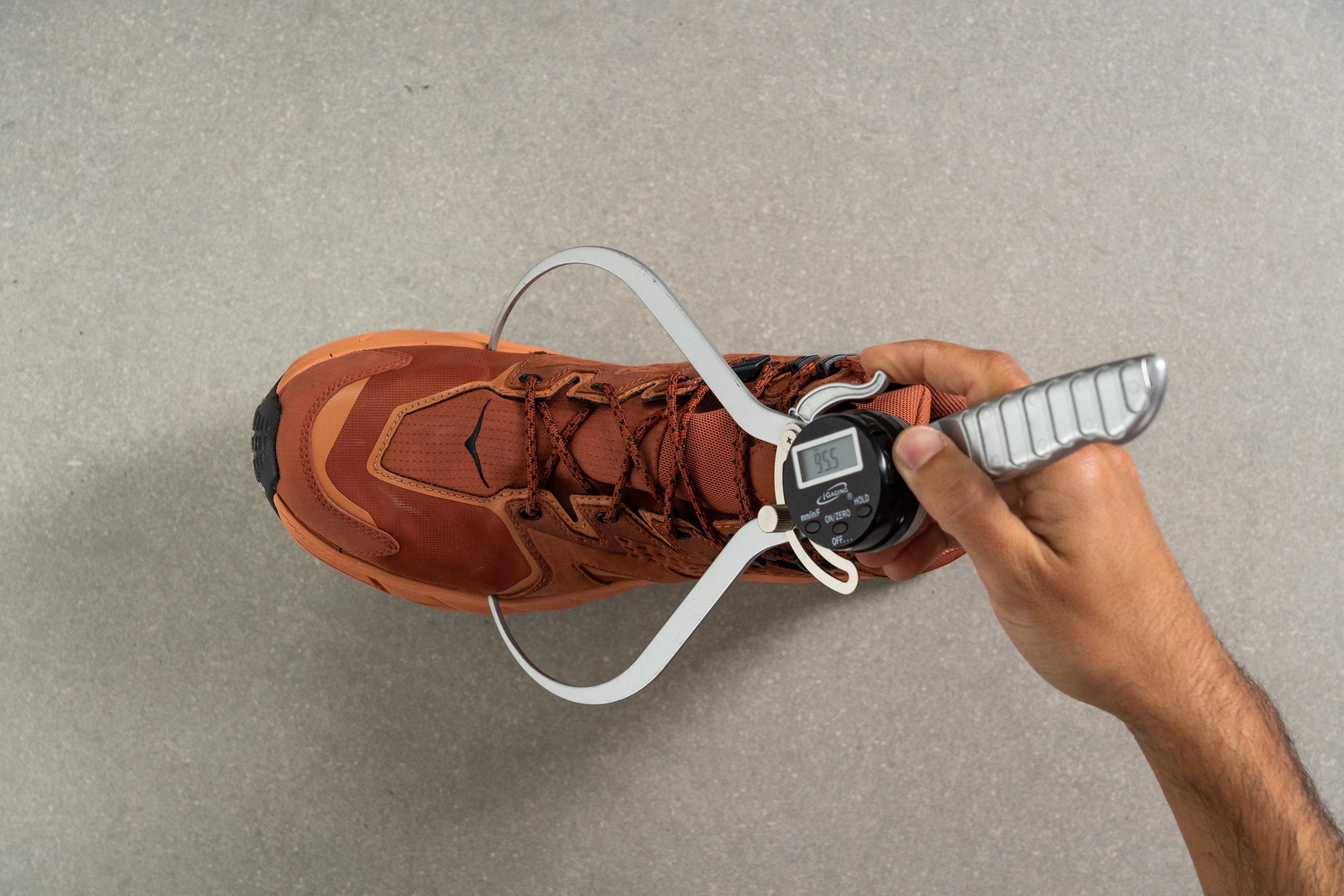
| Hoka One One Evo Rehi | 95.5 mm |
| Average | 101.8 mm |
HOKA Kawana Schuhe für Herren in Scuba Blue Bellwether Blue Größe 46
the hoka one one challenger atr 4 a surprisingly light max trail cushion running shoe.
In the case of the Hoka One One Evo Rehi, we measured it to be 74.7 mm, which is exactly the average for hiking boots.
Based on these two measurements, we tag the Anacapa's toebox width as medium (but with a slight tilt towards the narrow side of the spectrum).
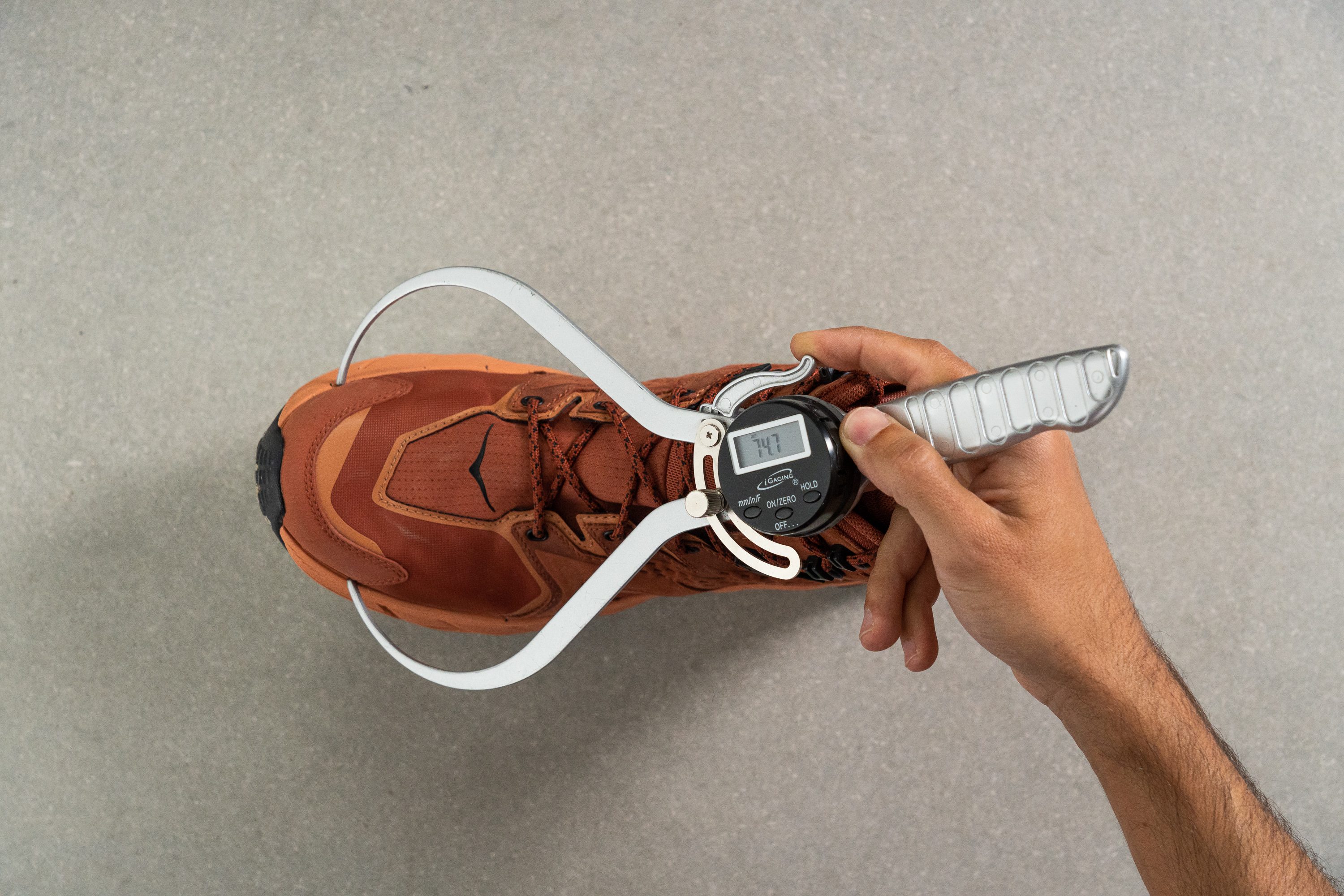
| Hoka One One Evo Rehi | 74.7 mm |
| Average | 78.4 mm |
Tongue: gusset type
This Hoka boot comes with a fully-gusseted tongue on both sides. We found it to be extremely efficient in keeping the water and debris at bay while securing the foot firmly in place.
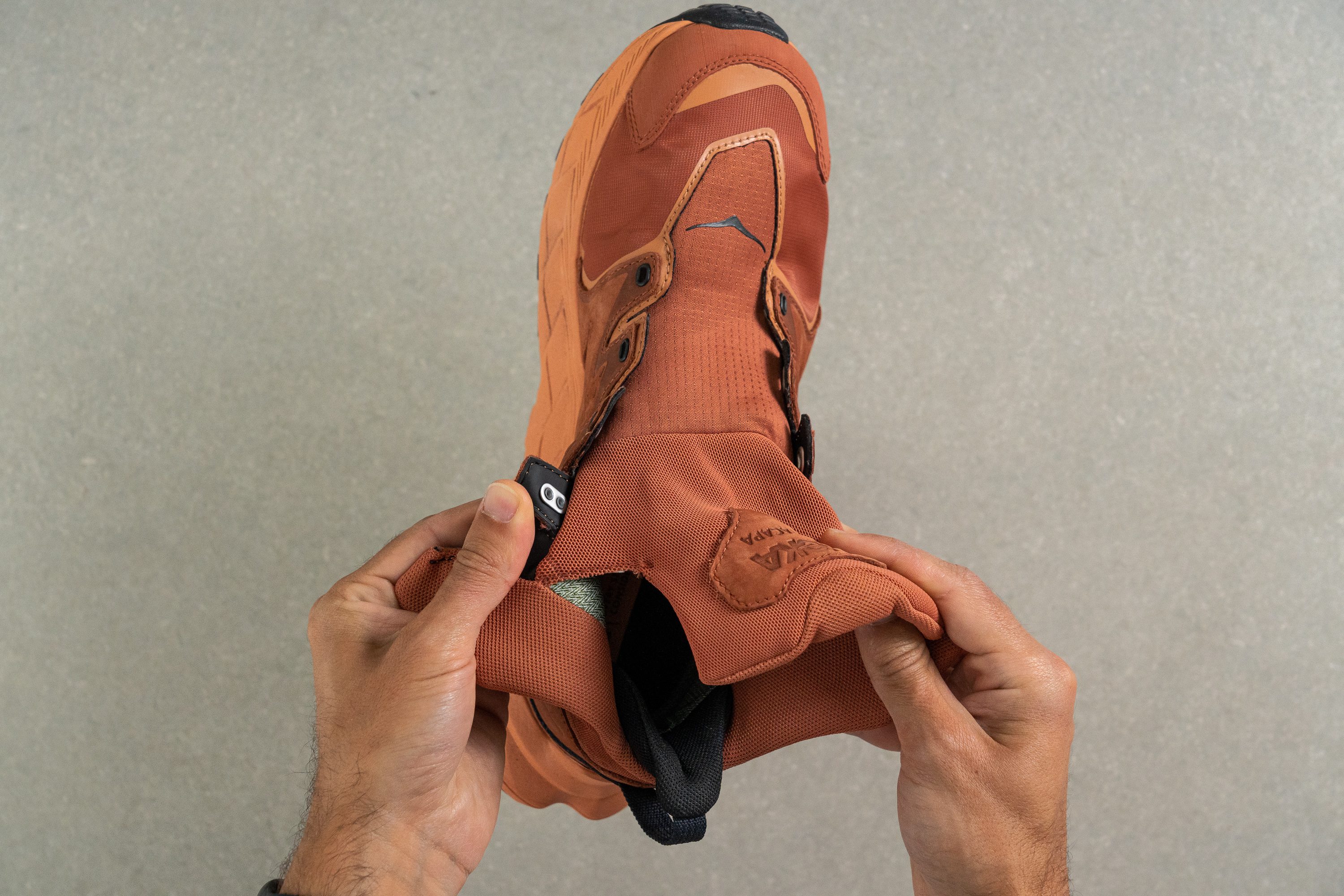
| Hoka One One Evo Rehi | Both sides (full) |
Comfort
Tongue padding
The collar and tongue padding is not superabundant in the Hoka Hoka One One Evo Rehi. We measured its tongue's thickness at 8.7 mm which is less than the average of our lab-tested hiking boots.
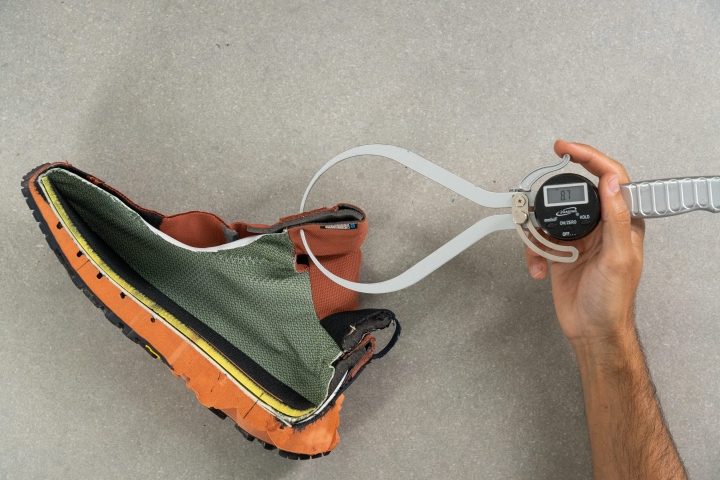
zapatillas de running HOKA constitución media blancas.
So if you are in search of a total lockdown in this area to carry heavier backpacks, we recommend going with the Hoka Kaha 2 GTX zapatillas de running HOKA ONE ONE voladoras 10k talla 39.5.
| Hoka One One Evo Rehi | 8.7 mm |
| Average | 11.2 mm |
Heel tab
The finger loop is an absolute necessity in the Hoka Hoka One One Evo Rehi. Because of its unique double-layered heel design, we found it a bit tricky to get inside the boot quickly. We do need to unlace the boot halfway and use the finger loop to be able to slide into it.
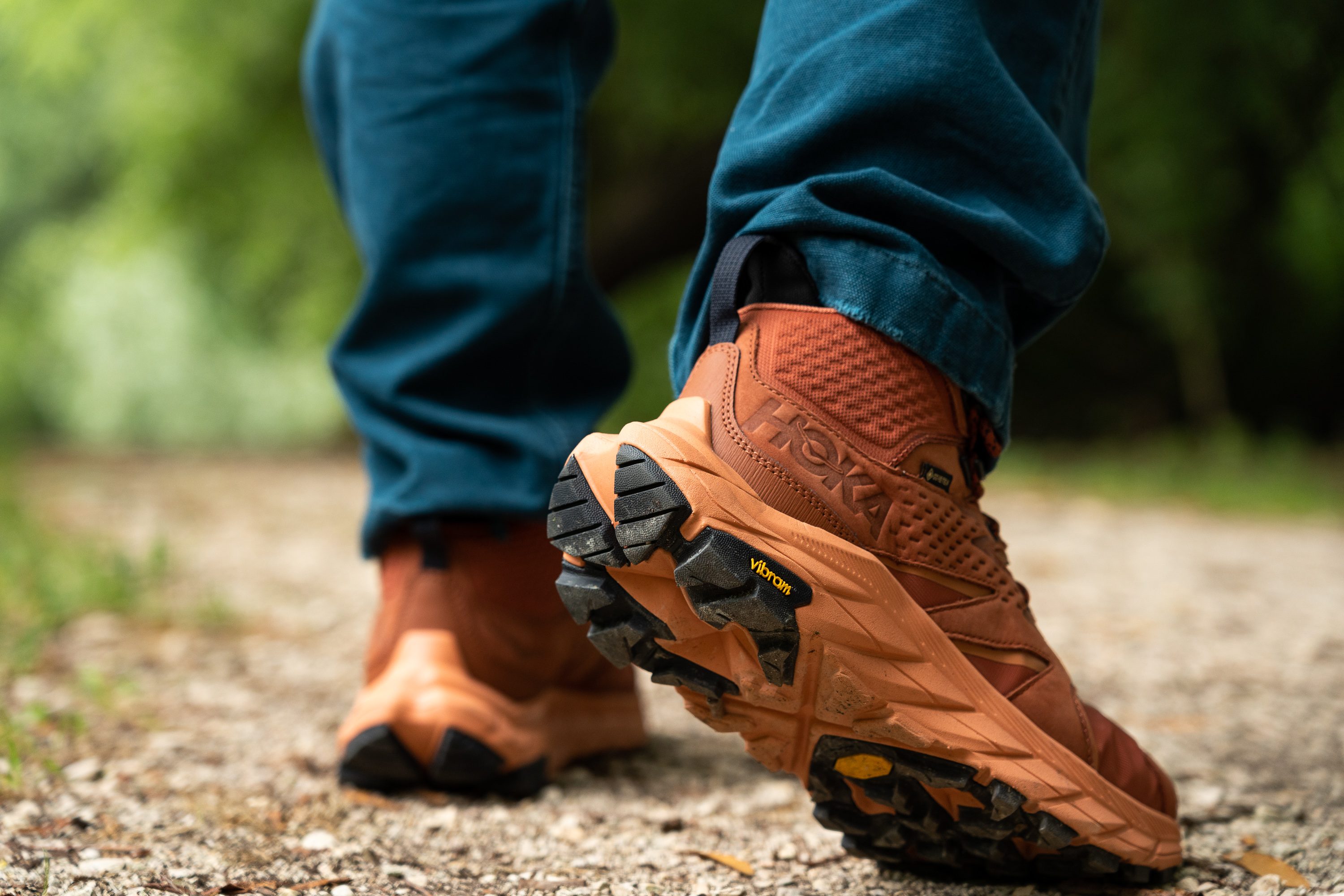
| Hoka One One Evo Rehi | Finger loop |
Removable insole
This Hoka boot comes with an easily removable insole. We don't see any problems replacing it with a custom orthotic if needed.
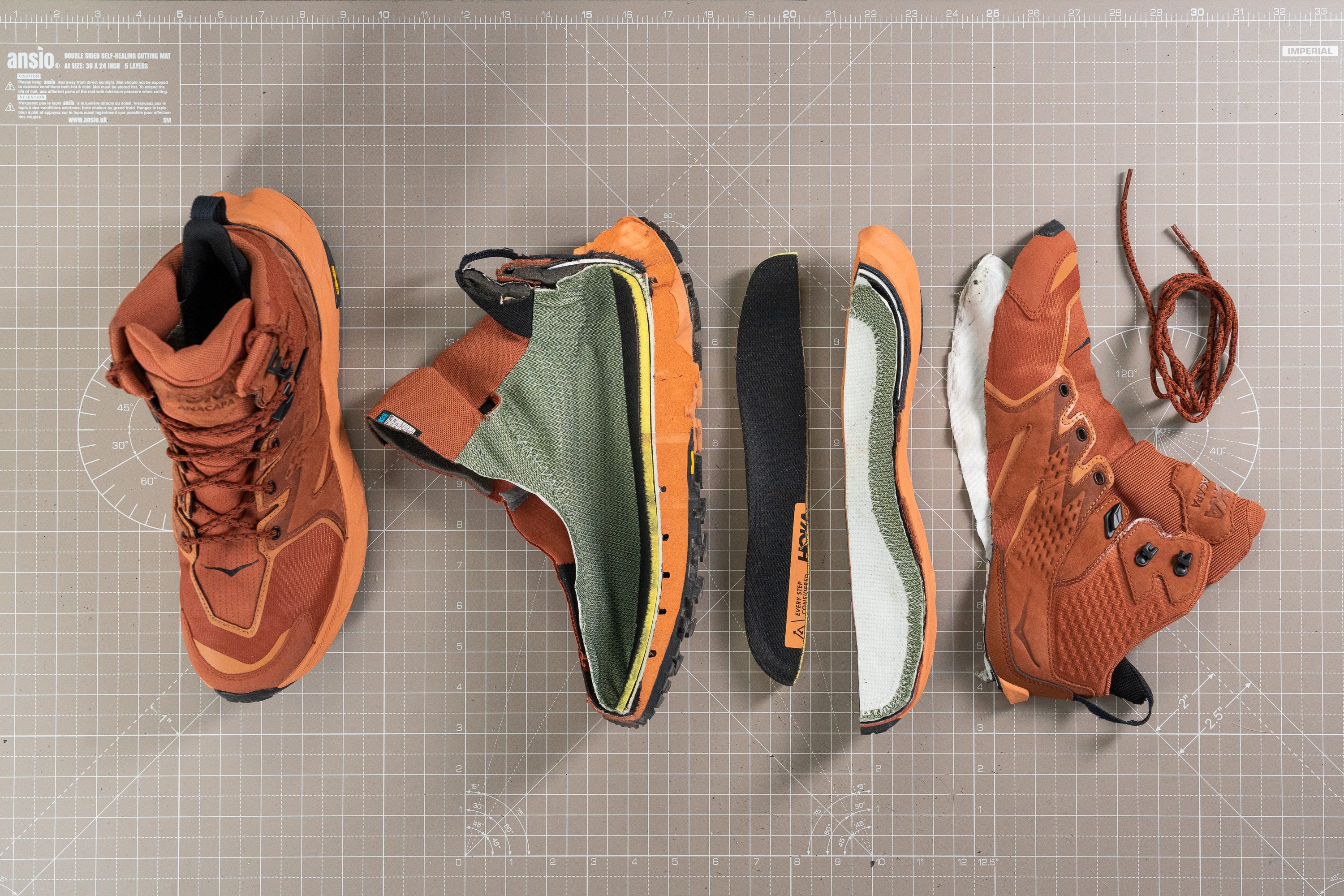
| Hoka One One Evo Rehi | Yes |
Lacing
In our opinion, Hoka made a great choice with the lacing system here. With three pairs of lace locks, we found it effortless to regulate the fit in the Anacapa Mid.
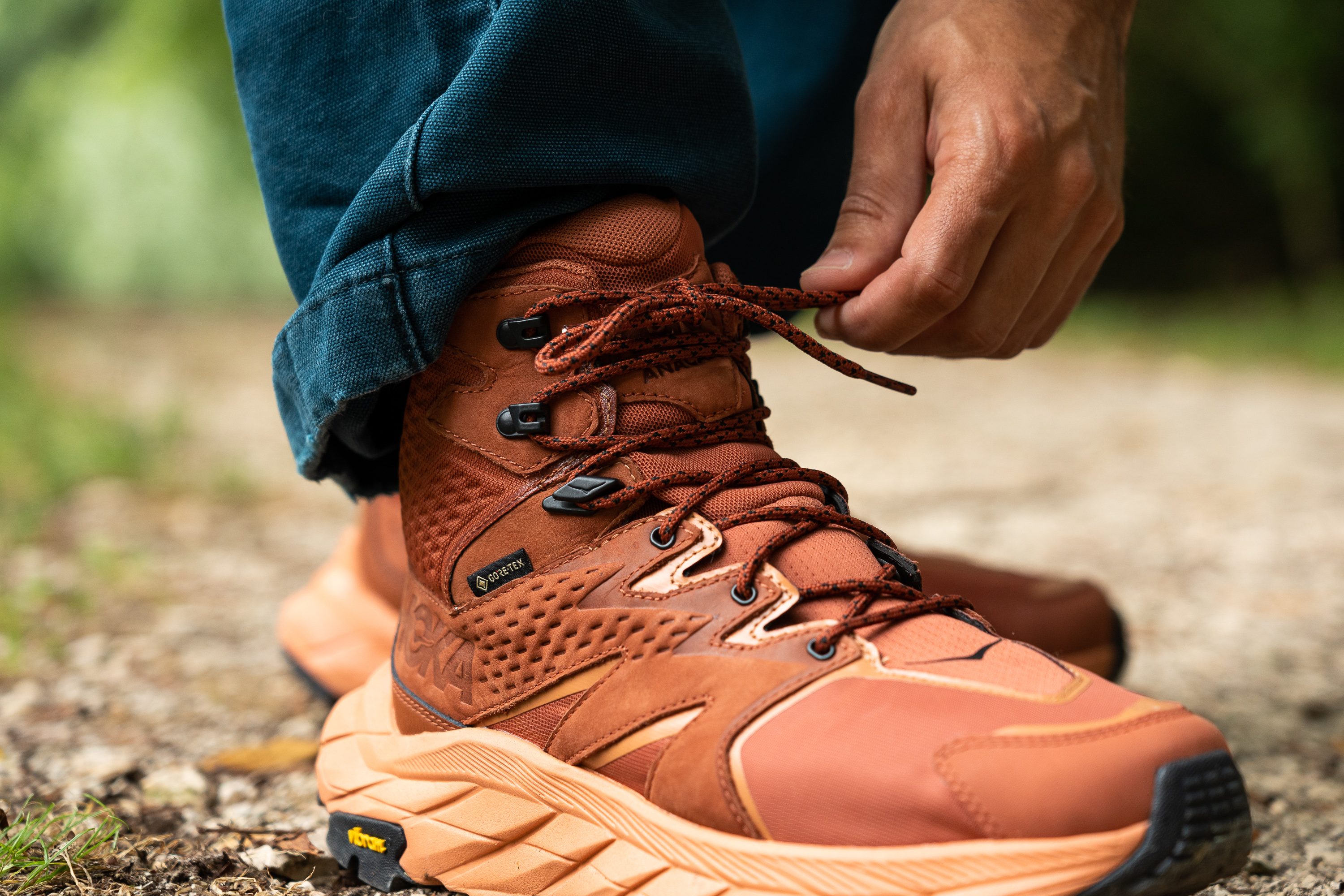
Misc
Sustainable materials
It's always a nice bonus to see sustainable materials incorporated into hiking footwear. The Hoka Hoka One One Evo Rehi features recycled polyester in its mesh and fabric layers as well as in the strobel board. Also, 50% of its sockliner is claimed to be made of soybean oil.

